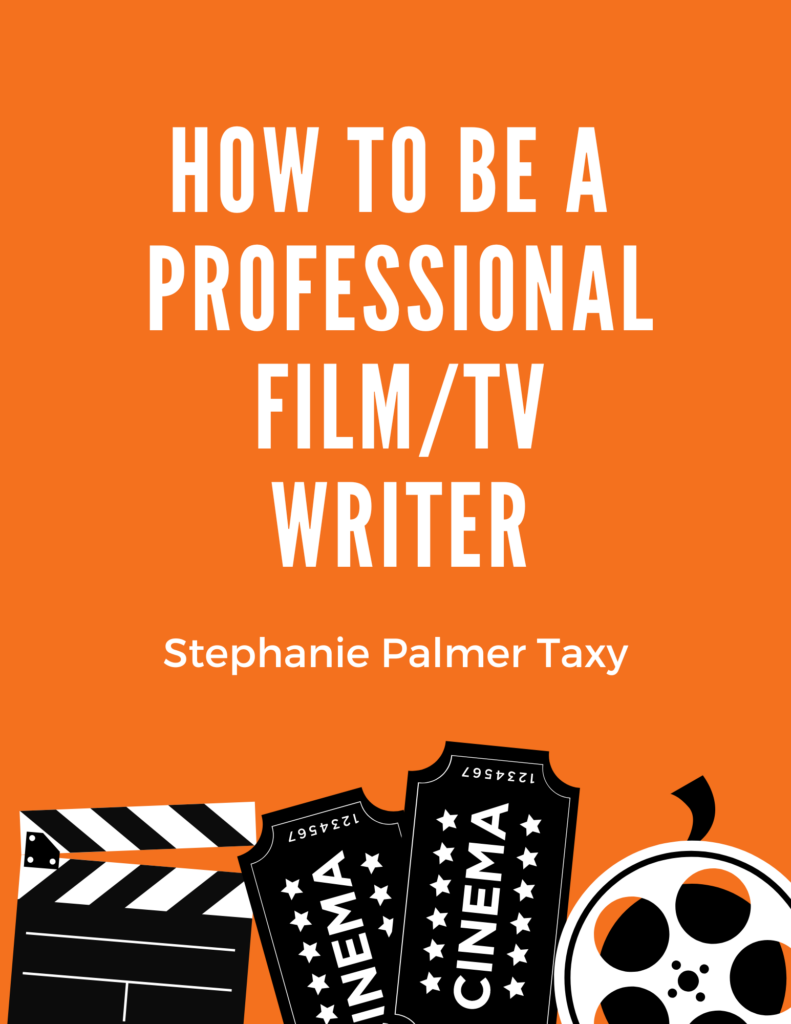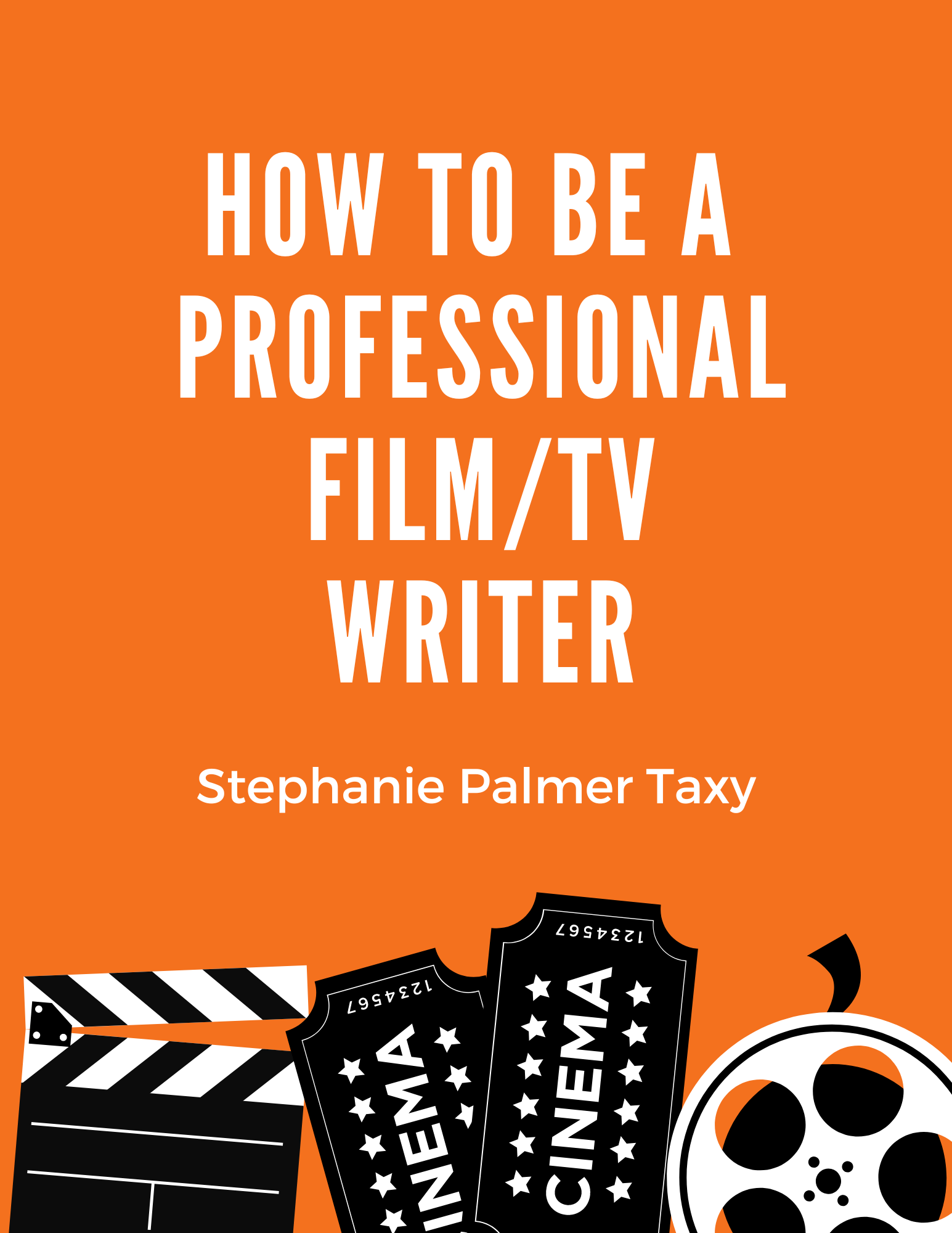Welcome Film/TV Writers!
You want to create a lucrative, lasting, full-time writing career.
Maybe I can help.
- As a film executive with MGM, I heard more than 3000 pitches, hired and worked with hundreds of writers, and supervised the purchase and production of over 20 feature films.
- As a coach, I have helped screenwriters around the world to find representation, get hired for jobs, and sell material.
- As a writer, I sold a book proposal and wrote a best-selling book.
I’ve sat on all sides of the table. However, I’m not a screenwriter.
That’s why my advice may be different from what you've heard before.
Let's stipulate that you're good at storytelling, you're a good writer, and that being a good writer is really hard. I don't mean to minimize that.
It's just that no one powerful enough to advance your film/TV career is reading your writing until you prove that you're good in a room.
- If you can't pitch an idea in a way that brings other people on board, no one will read your work.
- If you can't connect with VIPs, you won't get high-stakes meetings in the first place.
- And if you don't know how to sell yourself and your work....
This is the real heartbreaker.
Because you typically don't find out you've been selling the wrong things in the wrong way until you've been on the wrong track for a long time.
Let's jump in and get you (back) on the right track.
9 Steps To Become A Professional Film/TV Writer
1: Identify What You Really Want To Do In The Business
2: Develop A Library Of Material
3: Learn To Pitch
4: Reach Out And Connect
5: Get Hired To Write Professionally
6: Get An Agent
7: Take "The Water Bottle Tour"
8: Establish Your Positioning And Climb The Ladder
9: Branch Out (If You Like)
Step 1: Identify What You Really Want To Do

Most writers get stuck right here.
They think, I could write film, TV, I could direct….
They write different kinds of material, and some may be really good, and they think they’re getting somewhere as the years keep on passing by….
One day they meet a VIP who could really help them, and the VIP asks, “So, what do you really want to do in the business?”
The writer answers, “I want to write film, TV, maybe direct….”
And the VIP smiles, nods outwardly, shrugs inwardly, and prepares to never talk to this writer ever again.
After all, you can’t help someone get what they want if they can’t tell you simply and clearly what they want.
Don’t let this happen to you.
Instead, choose a medium and a genre, and get to work on becoming an expert in that area.
You have to point your creative compass in a really specific direction or end up going in circles and arriving nowhere at all.
Step 2: Develop A Library Of Material

The key to this step is the word “library.”
This means, at a minimum, you need to create two finished scripts in the same medium and genre. Three would be better. Ten would raise your chances of success dramatically.
Why do you have to have a library and not just one great script?
- The best time to sell your second project is immediately after you sell your first project.
- The best time to sell your third project is right after you sell your second.
- Your second and third projects are likely to sell for increasingly large sums of money.
The larger your library of material, the more attractive you are to agents, and the more likely any one of your projects will sell.
NOTE: with extremely rare exception, new writers do not sell TV material.
TV shows are developed by established TV writers. This is because TV is a writer’s medium where writers are the authorities on set, so when a TV pilot is sold, the person who writes the pilot is expected to have the experience and ability to run the show.
That may be disappointing to hear, but even if you can write a great pilot script, that doesn’t mean you have the skills to manage a multi-million dollar business and hundreds of people.
Step 3: Learn To Pitch

Typically, writers learn to write before they learn to pitch. Writers only learn to pitch when they realize that decision-makers don't read scripts unless the pitch has already brought them on board.
The agent's assistant has to convince the agent to consider the script. The agent has to set a meeting with an executive. The executive has to convince the studio President to give the greenlight. The studio President has to convince the distributors.
All along the way, very few decision-makers (if any) are reading the script until it seems like the project has legs. Only then is it worth it to actually read the full script (if at all).
The point is this:
Your material doesn’t sell itself. Your pitch sells the material.
Step 4: Strengthen Your Relationships

Film, TV, SVOD, and other projects in the visual medium are made by teams.
That's why your network of relationships, your ability to connect with other people, and your meetings skills are as important as your writing ability.
Each quality person you add to your network dramatically increases the chance that when you have developed the library of material that you need, you will know someone (or know someone who knows someone) who can help you.
NOTE: Networking efforts also include developing relationships with VIPs.
Make sure to treat VIPs with extra care. Don’t pitch them your ideas. Don’t ask them for anything. Just be a friend, be useful to them, and wait until you are ready before asking them for help. That’s a high-stakes meeting you only get to have one time.
Step 5: Get Hired To Write Professionally

Steps 2, 3, 4, and 5 can blur together a bit. You’re writing, you're pitching, you’re networking, and somewhere along the way, opportunities start to roll in:
- Writing for a web series
- Writing industrials (advertising, marketing, or educational films)
- Writing jokes for a comedian friend
- Working as a writer’s assistant
- Doing a rewrite on an independent film
Most screenwriters get their first professional writing job without an agent or manager. It just happens because you’re out there meeting people and you’ve written at least one thing that demonstrates your ability.
NOTE: The people with whom you work professionally at this stage often become key VIPs in your network and powerful allies for you.
Step 6: Get An Agent

Talented writers often get stuck at this step.
They say things like, “Hollywood is so unfair. It’s all about who you know. I’ve got a great script – it’s like I’m holding a million dollars in my hand – but I can’t get anyone powerful enough to read it.”
Hollywood is absolutely unfair and whom you know is crucially important. However, what's probably going on is that the writer has tried to take a shortcut around one of the previous steps... and it’s usually step 1.
And no one at step 5 of anything wants to go back to step 1!
Still, a writer who is good enough to have gotten to step 5 can return to step 1 and work their back up to step 5 quickly for the same reason that it’s easier to follow a recipe the second time.
What I want you to understand is that there is a huge relationship between Step 1, where you identify what you want to do, and Step 5, where you get an agent who specializes in working with writers who do what you do.
Once you have a large deal pending, that's when an agent wants to swoop in, make the deal, and collect their commission – when you’ve done the hard work, made your own opportunity happen, and are right on the brink of a big payday.
Don't be upset by this. The 10% your agent makes is more than likely offset by your agent negotiating a better deal for you (thus increasing their 10%).
NOTE: You may also have found a manager, lawyer, or producing partner by this point, and that's great - provided they can help you get an agent. Agents are necessary to finding and negotiating deals large enough to support a full-time writing carer.
Step 7: Take "The Water Bottle Tour"

Your agent sets up a lot of meetings (e.g. 50 - 100) for you, mostly with development executives and producers who may be able to hire you or who could be interested in buying your other projects, possibly also with certain directors or stars who have expressed interest in your work.
In the business, this is known as “the water bottle tour" because everywhere you go, assistants offer hospitality, e.g., “Can I get you a bottle of water?”
You get the idea.
At this point, writers will fall into two groups:
- Those who EXPERIENCE the water bottle tour
- Those who TAKE it
Some writers only experience it:
A writer's agent sets them up to meet with executives, producers, directors, stars, and more. All these meetings with powerful people – it's an amazing experience. Everyone is really friendly and gives the writer great compliments.
The writer is thinking: “Finally – I’ve made it!”
But... the writer will make zero sales and get zero paying assignments.
Eventually, the writer's agent says:
“You know, this isn’t really working out.”
And now this writer is back to square one.
Except it’s not square one.
It’s actually further back.
Because at this point, the writer no longer has the element of surprise.
When you meet decision-makers for the first time, you’re fresh and shiny. It's your best chance to build relationships that result in sales and jobs.
If you can't convert on that chance... if you don't make any sales or get hired for any jobs after the water bottle tour... you're someone to whom the business has said "No."
That makes it more likely that you will be told “No” again.
Now, if you’re reading this and this has happened to you, don’t despair. You can reintroduce yourself once you improve your ability to take meetings, and, thereby, to take the water bottle tour and not merely experience it.
When you’re good at pitching and taking high-stakes meetings, you develop relationships with decision-makers on the water bottle tour.
They suggest projects to you and ask for your take. They call you to come in and pitch ideas. Eventually you are hired for rewrites and/or make a sale.
Step 8: Establish Your Positioning + Climb The Ladder

Your positioning means you are an acknowledged expert in your area. When a producer has a problem with a script in that area, your name comes to mind.
You get hired for bigger projects and complete those assignments. You meet more people in the business. Sell an additional script. If you're in TV, you work your way up from baby writer to story editor, co-producer, producer, supervising producer, co-executive producer, all the way to executive producer.
NOTE: You cannot control whether your work gets made. If it gets made, you can't control whether it's good. If it's good, you can't control if it's financially successful.
Yes, if your work gets made, made well, and made into a hit, you will benefit. What I want you to know is that you can be a well-regarded, well-positioned, successful screenwriter regardless of the eventual results (which are not, after all, in your control).
Step 9: Branch Out (If You Like)

Once you’ve established yourself as an expert in a particular area of the business, you’ve earned the right to take a chance.
You’re not a risky, unproven, new writer anymore. You’re bankable.
THIS is when you can try a new genre, different medium, directing, or being a writer-director.
NOTE: The reason so many writers get stuck at Step 1 is because Step 9 is where they are trying to START.
Letter From Stephanie
You've just read 95% of all my best Hollywood advice.
The remaining 5% is the deep dive into how to do it. It's detail-oriented, high-impact, difficult work, and it's just not right for most people.
I provided this information to my clients, one at a time, for years, and eventually created a course, which I've updated over 15 years.
The course has helped hundreds of screenwriters I've never met to get agents, get hired, and sell material. Essentially, the course has replaced me.
You could spend thousands going to film school and still not get this information. I will bet there is at least one idea in there that will save you from making a career-ending mistake.
In a moment, I'll tell you what's in the course, show what people have said about it, and answer the questions I can imagine you might have.
But first, let me say something that needs to be said.
Why You Should NOT Become A Film/TV Writer
1. Hollywood is a rough business.
- The old boys network is real, and you have to know how to handle it even if you are a white cis-gendered male (especially if you are not).
- The culture is often mean, superficial, and celebrity-obsessed.
- Misogyny, racism, homophobia, lookism, and ageism are common.
2. The odds are long.
There are thousands of people competing for hundreds of opportunities. As one example, in 2021's Nicholl Fellowship screenwriting competition, there were 8191 entries competing for 5 spots. That's a .061% chance.
Succeeding as a film/TV writer is like becoming a professional basketball player, Olympic medalist, or first violin for a symphony orchestra. It's hard, and it takes time, talent, and luck.
3. You may be better off doing something else first.
If what you have is an idea, and you're looking for the best way to get it out of your head, consider writing it as a novel, play, short story, or magazine article.
The best way to get a movie or TV show made is to make it a successful something else first.
Still here?
If the world of film/TV is where your dreams are, I understand.
There's a reason it's called THE business.
That's why I offer a course to help you become a professional screenwriter.
Module 1: How To Take A Hollywood Meeting
In Hollywood, meetings happen often, and the stakes can be very high. We're going to cover this material first because how you handle meetings in Hollywood is the key indicator of whether you're a rookie or not.
- Lesson 1: The Four Types of Writing Meeting
- Lesson 2: The 5 Stages Of Every Successful Pitch Meeting
- Lesson 3: Meeting Producers, Agents, Stars, And Directors
- Lesson 4: How To Handle Yes, No, and Maybe
Module 2: Create The Pitch For Your Screenplay
Pitching is the art of constructing the pitch as well as delivering it. What's important to understand is that your "pitch" isn't static, one-sized-fits-all - it's actually a set of different pitches you use depending on the context and the listener.
- Lesson 1: Deliver the Short Pitch
- Lesson 2: Establish Expertise with the Genesis Pitch
- Lesson 3: Talk About Money with the Comparison Pitch
- Lesson 4: Crush the 13 Trick Questions You Will Be Asked
Module 3: How To Get "In The Room"
You've probably heard the famous Hollywood maxim, "It's who you know," and that's true. You may already know the right people to open doors for you, or you may need to meet them.
- Lesson 1: Map Your Network
- Lesson 2: Reach Out To Allies
- Lesson 3: Take Care Of Your VIPs
- Lesson 4: Be Yourself Out
Module 4: Sell Your Screenplay (And Your Writing Services)
Selling in Hollywood is done without using most traditional selling techniques such as "prospecting" or "closing." What you need is to understand how the Hollywood ecosystem works so you can choose exactly what you want to sell (and to whom).
- Lesson 1: Sell Yourself
- Lesson 2: Be Where You Belong
- Lesson 3: Sell Your Expertise
- Lesson 4: Build Your Team
The How To Be A Professional Film/TV Writer course is four modules, each delivered in eBook form.

Andy Licht
Producer, The Cable Guy, Waterworld
"How To Be A Professional Film/TV Writer is easy to understand, practical, and tells the truth in a very helpful way. This should be required for all film students and aspiring writers.”

Mindy Kanaskie
Co-producer, The West Wing, Studio 60
“When folks ask what the secret is to getting their series picked up, or film read – this is it. Stephanie's got the best solutions to all those questions that come from those who want 'in', who are talented and hungry but uncertain.. All creatives should have this information.”

Jonathan Wolf
Executive VP of the American Film Market, Independent Film & Television Alliance
“Stephanie’s insights are the most powerful and valuable pitching tools a filmmaker can have.”

Blake Snyder
Screenwriter and best-selling author of Save The Cat!
“Stephanie Palmer helps writers to be good in a room — and she is the best there is. Success stories abound with this fun and enthusiastic method to pitch and win.”

Sebastian Twardosz
Partner, Circus Road Films
“It’s taken me many, many years to learn what Stephanie has distilled in this course. I wish I knew all these things when I first embarked on my career. I’ve been to USC film school, I teach at USC film school, and I’ve had stellar jobs working for ICM, Tom Cruise, and Paramount Pictures just to name a few. But I can tell you that I would have gone further and faster had Stephanie’s resources been available to me when I first started. She is knowledgeable, insightful, and she is right about what it takes to succeed in Hollywood.”

Andy Dowling
Screenwriter
“The most honest, straightforward, and practical info you'll ever get on breaking into the industry. There's nothing esoteric about this program - it's a road map. As someone just starting out in the business, this program gave me information that I would have never uncovered on my own. Stephanie truly wants her fellow writers to succeed. She has leaked more inside secrets than Edward Snowden. Take full advantage, before they whisk her away.”

Pete Chatmon
Director, Premium
“This is an awesome resource. After spending all those months and years working on your script, why let the final mile of the race fall by the wayside to luck or chance. Knowing how to best present your material, cater to your audience, and maintain your integrity is crucial to your success. I highly recommend this!”

Lisa Ridarelli
Screenwriter
“So many people make the industry seem like a maze or a puzzle, and Stephanie blows that myth to pieces. Stephanie provides real-life examples and it makes the process relatable and less scary. As someone just starting out in this business, after reading this, I feel much more confident.”

Bradford Richardson
Screenwriter
“I am truly awestruck by your new program. It’s like you somehow reached inside my brain and discovered exactly what I needed to learn. It’s like you’re my personal career trainer, guiding me through every step of creating a successful screenwriting career.”

Gustavo Garzon
Screenwriter
"I am a screenwriter in Argentina. Good in a Room integrates concise, simple, and effective lessons for you to implement the art of the pitch. The approach to pitching goes to the very root of your creative soul: by guiding you to understand the why and how, the course aims to help you rediscover, review, and reorganize your project and pitch so that you can sell it like an expert to agents, producers and studio execs.”
FAQ
It depends on your writing ability, how many polished projects you have, and whether you are having real meetings. The course will help you with the last part.
Check out The Writer's Guild of America Minimum Basic Agreement and the 2023 MBA Contract Changes which detail the results of the recent negotiations.
Also.... Some people get into screenwriting because they think it will be an easy way to make money quickly. It’s really not. However, there are lots of people who have a day job and write on the side until they break in.
If you’re taking meetings and they are turning into script sales and paid assignments, you don’t need this course. But if you’re taking meetings and not making sales or getting hired… you are potentially wasting real opportunities.
No. It’s important to me that you retain all rights and ownership to your projects. I am not an agent, manager, producer, or lawyer.
No. I will help you to see your story from the decision-maker’s POV, avoid "red flag" mistakes, deveop a compelling pitch, and deliver that pitch more effectively.
For story notes, script notes, or other Hollywood-related advice, I recommend Ryan Dixon. I've worked with Ryan for many years. Ryan has written projects for studios and stars including Disney, Amazon, Universal, Dwayne "The Rock" Johnson, Arnold Schwarzenegger, Josh Gad, Jim Caviezel, and Joe Manganiello. Previously Ryan managed the screenplay development company Scriptshark.
You can, I just will likely answer, "get the course, see if it answers your question, and if it doesn't, return the course for a full refund." You can also contact my go-to screenwriting consultant, Ryan Dixon.
A legit agent should have a verifiable track record of sales and be willing to disclose it. Their history of selling material is the best indication of their expertise. You should be able to find their agency online and their name mentioned in The Hollywood Reporter, Variety, or Deadline.
Also, a reputable agent earns their income entirely from commissions, not fees. So your agent should never charge you for anything - what they want is their 10%.
In my experience (even though this is a steretype) the longer someone talks on the phone with you, the lower on the food chain they are likely to be. Really successful agents know that their time is extremely valuable and they are incredibly brief and direct.
Well... you don't.
The primary way that decision makers such as agents and managers find new clients and projects is not via query letters, cold calling, or cold emails, but by referral from someone they know (eg. friends, colleagues, clients). The course will help you access your network, develop the right relationships, and get your script to decision-makers via referral, aka "solicited."
You can... it's just that having multiple scripts makes you more attractive to agents because then they can generate multiple sales – and while the first sale is likely to be for the WGA minimum, the second and third sales can be for large sums of money.
Yes... you can sell scripts for shorts, for industrials, for extremely low-budget non-union productions, etc., without an agent. You just won’t make very much money.
To sell a script for enough money to be able to make your living as a film or TV writer, you will almost certainly need an agent, and the course will help you with that.
It’s true that getting an agent at any point is a victory and sets you apart from many other writers.
However, other things being equal, an agent is more likely to prefer a new writer than someone another agent has signed and dropped.
One of the things a manager will do is help you get an agent. This is because when you have an agent, you’re much more likely to sell material, and this is to your manager’s benefit.
If your manager hasn’t done this, you’re going to need to do it yourself, and the course will help you with that. Once you’ve raised your game to a level where you can get an agent, you’ll get more out of your manager as well.
The idea from the agent’s POV is that you’re an initial payday followed by an ongoing revenue stream and future paydays.
Typically what happens – what the agent wants to happen – is that you’ll sell a script or two, and then with the heat you’ve generated, be able to get assignments and rewrite jobs. While you’re doing jobs that pay you’re writing specs, and the agent looks to sell your spec material.
So, if you’re not interested in assignments, you’re less attractive to agents, but that's not a dealbreaker if you have a lot of great material that is ready to be sold.
Agents, studios, and TV networks will only be open to considering your project when you have a completed screenplay.
Imagine going to a restaurant, ordering chicken soup, and getting a plate of raw vegetables, dry noodles, and raw chicken?
Potential Hollywood buyers need to see the fully cooked meal to be able to decide if it is something they want to pursue. To approach them before can be detrimental to your chances.
It helps you in the sense that because you work in the business, you’ll have an easier time accessing your network to get meetings.
However, once you’re in the room, your other Hollywood-related experience doesn’t help you at all.
No agent is going to say, “Well, his writing isn’t great, but he does manage a TV station... let’s represent him.”
So, your experience gives you more access, but otherwise the quality of your writing and your ability to handle yourself in high-stakes meetings is what will determine your success.
You’re in good company. Most writers hate meetings – but the reason they hate them is because so often they end up going nowhere. If meetings led to you getting paid, I imagine you would enjoy them more. 🙂
Many of the top writers are just like you. The course explains exactly to handle meetings so that you can look and act confident in handling the small-talk and communicating your ideas. Over time, you'll start to feel confident as well.
Autobiographies are stories and should be pitched the same way films and TV shows are. Whether the screenplay you write becomes sellable will have a lot to do with the story of your life.
Include your novels when talking about your work if the content for your novels and the content for your screenplays are similar, i.e., if you write romance novels for middle-aged women and slasher horror screenplays for young men, then your novels don’t help make your case for representation. If you write romance novels and romantic comedies for middle-aged women, then your novels help you because they demonstrate relevant expertise and enthusiasm.
The course will help you the same way it would help a writer - you need the same strategies and tactics to succeed.
Keep in mind, however, that you are a slightly different value proposition to representatives. A writer might work on a project for a few weeks, months, even a year or two. A director or writer-director (which should really be "director-writer" because directing is the more essential skillset), invests in a project for 2-5+ years.
That's why paydays are less frequent for directors, the market for talent is different than for writers, and the people who rep directors and writer-directors tend to specialize in directors just like literary agents specialize in writers.
The material in this course has helped many aspiring creatives around the world, including in the UK, New Zealand, Canada, China, India, Brazil, Russia, Japan, and more.

Gustavo Garzon
Screenwriter
"I am a screenwriter in Argentina. Good in a Room integrates concise, simple, and effective lessons for you to implement the art of the pitch. The approach to pitching goes to the very root of your creative soul: by guiding you to understand the why and how, the course aims to help you rediscover, review, and reorganize your project and pitch so that you can sell it like an expert to agents, producers and studio execs.”
The course has helped many people in their 40's, 50's, and 60's to pursue their creative dreams despite their busy and demanding careers.

Rafael Guber
Screenwriter
"Stephanie Palmer will add ten years to your life. These are the years you will not have to waste making dumb mistakes as you try to break into the business. Not only will you avoid the mistakes, you will learn how to do the right things in the right way at the right time. Thinking about getting this program is like talking or thinking about exercising. Just do it!"
I offer a 100% money back guarantee. So, if you've given it your best shot and haven't made any progress, return the course within 30 days for a full refund.
No. And if that’s disappointing to you, I understand. Many people come to me hoping I will make an introduction for them and so I want to be very clear on this point:
I don’t make introductions for you because that makes you dependent on me and also puts me on the hook for whatever you may do in the future.
However, I will absolutely teach you how to make introductions and get referrals for yourself, and I have a proven track record helping writers to do just that.
I don’t “give you a fish” one time.
I teach you “how to fish” for the rest of your life.
Get the course that has helped film and TV writers all over the world to crush pitch meetings, get agents, sell screenplays, get hired to write, get staffed on TV shows, and more!
FADE IN - THE RED AGENCY
MATT, a junior agent, is standing in front of a giant white marble desk.
Behind the desk sits SUSAN, the top agent at the Red Agency.
The only things on her desk are a multi-line phone and bluetooth headset.
In fact, the entire office – decorated almost entirely in white with red and black accents – is uncluttered, spotless, pristine, and imposing.
SUSAN: You’ve had your desk two weeks and you’ve brought me nothing.
MATT: I’m working my ass off, Susan.
SUSAN: I’m sure you are. Let me guess – you’re on the phone all day.
MATT: I am.
SUSAN: You’re booked for every meal.
MATT: Yes, absolutely.
SUSAN: You’re reading every piece of coverage.
MATT: Of course.
SUSAN: Guess what? That’s what every other new agent in town is doing.
SUSAN pauses for a moment to glance at her phone – there are several new blinking lights.
MATT knows this meeting is going to end soon... and maybe his job, too.
SUSAN takes a deep breath.
SUSAN: Remember what I am about to tell you. I will not repeat it.
There are three ways to get new clients and two won’t work for you:
Number one: you can poach a client from another agency – but it’s more likely that a more experienced agent will poach the writer first.
Number two: you can get a referral from a client who is already here – but it’s more likely that a more experienced agent will get the referral.
Number three: you can find a super-talented and undiscovered writer and you find them before anyone else does.
MATT: That’s what I’m trying to do.
SUSAN: I know – but you’re doing it the same way everyone else is.
MATT: Boss, tell me what to do.
SUSAN: You need to get out into the community. Go to birthday parties, take classes in person, take online classes, form or join a club – you need to build your network with more regular people because that’s how you find undiscovered talent.
MATT: That’s going to take a lot of time.
SUSAN: Exactly. Look, I didn’t hire you because you’re a great negotiator who can cut great deals for the best writers in the business. That’s what I do. You’re here to discover the writers who are going to be the best in the business 3-5 years from now.
MATT: I hear you.
SUSAN: Look, I get it – there are a million wannabe writers in this town and more all over the world. You have to meet a lot of them, and it’s going to seem like a massive time-suck.
MATT: Right.
SUSAN: So, as soon as someone sends up a red flag or seems like a rookie, get out, and as soon as you think you’ve found someone with talent and a clue about this business, get on it.
MATT: Got it.
SUSAN: And bring me something soon.
MATT: Right.
SUSAN: And don’t bring me anything unless you’re prepared to stake your job on it.
MATT: Right.
And as SUSAN picks up her phone, we CUT TO:
You....
Get the course that has helped film and TV writers all over the world to crush pitch meetings, get agents, sell screenplays, get hired to write, get staffed on TV shows, and more!



